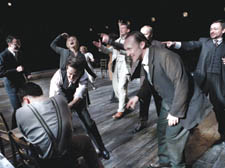|
|
 |
| |

Performance of Our Class at The National Theatre |
Pupils poles apart on eve of Holocaust
OUR CLASS
National theatre
The central feature of the National Theatre’s impressive production of Our Class, the burning of 1600 Jews in a barn in the small Polish town of Jedwabne in 1941, has become topical. Until 2001, the Nazi occupiers were held responsible. After new research indicated that local Poles had perpetrated the massacre, President Aleksander Kwasniewski apologised to the Jewish people on behalf of his country. It is this “global” apology that has been disputed by Michal Kaminski, the ally of the Conservative party in the European parliament, who posits that the perpetrators deserve to be condemned rather than the entire nation.
Tadeusz Slobodzianek’s new play, adapted by Ryan Craig, throws light on this incident (though Jedwabne itself is not mentioned) by following the vicissitudes in the relationships and the fate of a group of 10 classmates – five Poles and five Jews – from their childhood at school in 1925 until 2002. From innocents sharing their ambitions, through the segregation of the Jewish pupils during prayer ceremonies, to the overt antisemitism that flares up after the Soviet invasion in 1939 and becomes even more intense during the Nazi occupation, the classmates, although admirably portrayed as individuals by a team of extremely skilled actors, nevertheless reflect the larger reality.
The ringleader of the Poles, Zygmunt (Lee Ingleby), is as cunningly hypocritical as he is vicious.
He betrays a Polish classmate to the Soviets; pins the blame on a Jew, thereby causing him to be beaten to death; actively participates in later atrocities, yet in 2001 begs Abram, a Jewish classmate who escaped to Rabbinical School in the USA and remains attached to memories of his schooldays, for money for the memorial to the massacre. Two Polish classmates, however, are less than comfortable with the brutality of their fellows, one of whom even has the nerve to become a priest. Each shelters a Jew during the war.
The setting chosen by director Bijan Sheibani is a rectangular pit adorned with schoolroom chairs. Against this simple backdrop there is effective miming of the horrors that punctuate the action, not least the gang rape of Dora (Sinead Matthews), who, while terrified, confesses to feeling pleasure.
Her last moments in the barn are harrowingly conveyed.
Amanda Hale is also moving as Rachelka, obliged to convert to Christianity to marry the classmate who saved her. Only as a widow does she finally derive some satisfaction – from television channels – even though there, once again, she faces discrimination as a “Jew”. As for Kaminski’s contention, the jury’s out!
|

|
| |
| |
 |
|
|
 |
|



